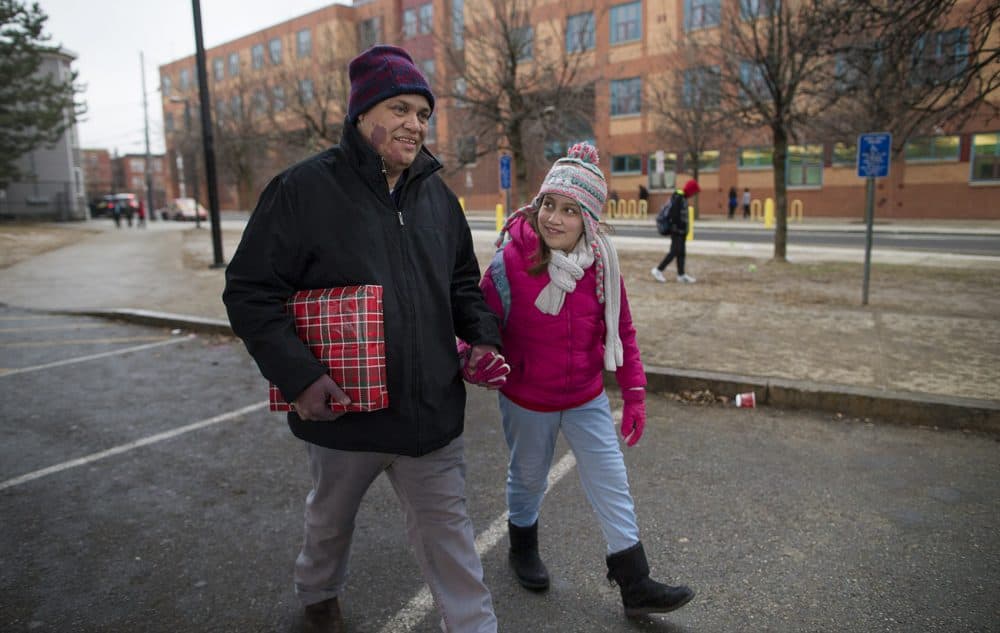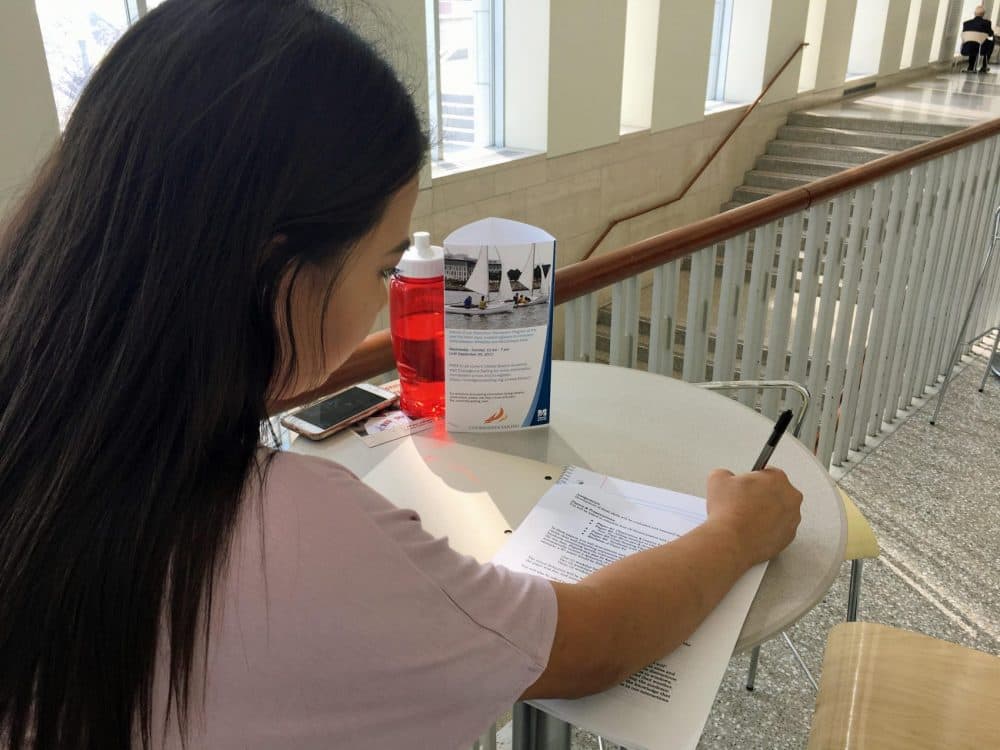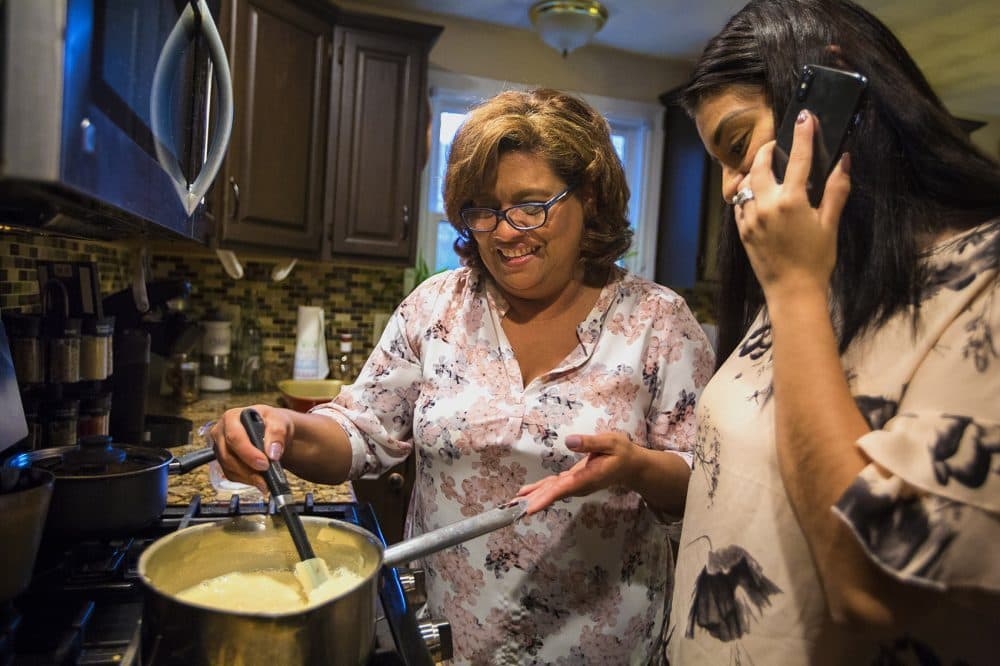Advertisement
How 4 Key Elements Of Immigration Policy Changed In 2017
Resume
The issue of immigration continues to grip the country — and capture headlines — in a year when President Trump's campaign promises turned into policy.
We followed how four key elements of immigration policy changed, and how those changes directly affected people in Greater Boston in 2017.
The Travel Ban
It all started with the president's original travel ban, which barred travel to the U.S. for people from seven predominately Muslim countries. The order went into effect immediately and many government agencies weren't fully briefed on the details.
The result was chaos. Protests broke out in airports all over the country, including Boston's Logan, as desperate family members worried and hoped their relatives from certain countries were able to make it to American soil before the ban hit.
At Ascentria Care Alliance, a refugee resettlement agency in Worcester, Mohammed Najeeb said he felt powerless in the face of the ban.
"I received calls, they come in person, they're asking me questions that I really don't have answers to, and I wish I could have answers to them now," he said in January.
Since then, the president has issued updated versions of his travel ban in response to legal concerns and court challenges.
The resettlement of refugees was also temporarily halted this year and the number of refugees who will be accepted into the U.S. moving forward was slashed.
Deporting The Non-Criminal
Perhaps the most fundamental shift that was put into place with the stroke of a pen was the transition to new immigration enforcement priorities, meaning a shift in which immigrants federal immigration officials are told to focus on when it comes to removal from the country.
The Obama administration said the focus should be on serious criminal offenders. But that focus changed with one of Trump's executive orders.
U.S. Immigration and Customs Enforcement (ICE) agents now have the green light, from the top down, to pursue deportation proceedings for anyone who is eligible for removal, regardless of criminal background.
Many immigration attorneys describe this shift as a game changer.
"What this means is that people who are eligible to obtain their green card in the United States, who are following the law, who are following the rules, who are doing what the government is instructing them to do, are going to be too terrified to show up and follow through with the process," said Susan Church, an immigration attorney. "And now a whole new category of people is going to go back into the shadow of immigration land and be living in fear."
These new priorities were on full display in March when ICE arrested five green card applicants at scheduled appointments in Lawrence, signaling a clear shift in tactics — and immediately having a clear impact on individuals and families.
According to ICE, between Jan. 22 and April 29, ICE Enforcement and Removal Operations (ERO) deportation officers arrested 41,318 individuals on civil immigration charges. That's up from 30,028 arrests between Jan. 24 and April 30 the year before. Arrests of immigrants in the country without authorization who have no criminal record have risen sharply, increasing from approximately 4,200 in 2016 to more than 10,800 during the same time 2017.
Since July, we've been covering one man whose case, in many ways, exemplifies this shift.
Francisco Rodriguez is a native of El Salvador who entered the U.S. illegally in 2006. He's been living in Chelsea with federal authorization for several years and was never a priority for deportation until this year, when the new enforcement priorities made him a target for removal.
The 44-year-old father of four U.S. citizen children was arrested in July when he showed up to a scheduled appointment with immigration officials. Rodriguez was recently released from ICE custody. He still faces deportation back to El Salvador but he will be able to stay at home, with GPS monitoring from ICE, while his appeal plays out in the 10th Circuit Court of Appeals.
DACA Deferred

Another immigration policy change in 2017 was the phasing out of the Deferred Action for Childhood Arrivals program, also known as DACA.
This program allows young people whose parents brought them to the U.S. without authorization to go to school and work, legally, in the U.S. There are thousands of DACA students in Massachusetts, and 800,000 recipients nationwide, who could be affected by the president's decision to phase out the program.
Paola, 19, was brought to the U.S. when she was a child, by her mother, from El Salvador. (Paola is her middle name.) She and her two sisters are DACA recipients and are fearful that if DACA ends, they will be forced to live in El Salvador, despite living most of their lives in the U.S.
Paola is a student at UMass Boston and wondered in September if the fall semester would be her last.
"I was obviously trying to focus in class, it's my first day. I want to be able to make sure that I do good, at least for the time that I'm able to go to school," Paola said, sitting among clusters of blue and white balloons and streamers hung to usher in a new school year. "At the same time [DACA] was in my mind because it's like, I'm sitting in a classroom, I'm taking a class right now, but I don't know if that's going to be the story in a year from now."
Trump has instructed Congress to prepare a legislative solution by March 2018.
Temporary Status For Some Comes To An End

The Trump administration announced an end to Temporary Protected Status (TPS) for Nicaraguans and Haitians living in the U.S. The program allows people to live and work in the U.S. temporarily if their country has been hit by a natural disaster, a health epidemic or civil war. Greater Boston is home to one of the largest Haitian diasporas in the country and the decision affects nearly 5,000 Haitian TPS holders in Massachusetts.
The future of TPS for El Salvador is also in question. There are an estimated 6,000 Salvadorans living in Massachusetts with the temporary immigration status.
Standing in their Haverhill kitchen in November, a mother and daughter shared a conversation about their family's future given the uncertainty of TPS. They said they had always avoided talking about the future, but that is no longer possible.
Each member of their family, it turns out, has different legal pathways. Twenty-two-year-old Gabriela Portillo-Perez married a U.S. citizen and should be eligible for status through her marriage. But if the U.S. government lets the TPS program expire for El Salvador, Portillo-Perez worries the rest of her family will be sent back.
"They're the only family I have here and it's funny because people don't realize, you know, they think of, 'oh these people break the law' or whatever it is but they don't realize like, we're all human beings, and we're all a family and you know, you always need your mom," she said.
The administration is expected to make a decision on the fate of TPS for El Salvador in early January.
This article was originally published on December 27, 2017.
This segment aired on December 27, 2017.
